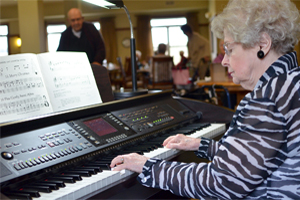Technological advancements are playing a growing role in supporting individuals with dementia and their caregivers. These innovations emphasize independence, safety, cognitive support, and caregiver assistance. From wearable devices to AI-driven platforms, new tools are reshaping dementia care. Here are some of the most promising developments:
1. Wearable Devices for Monitoring and Safety
Wearables such as GPS trackers, fall detectors, and heart rate monitors enhance safety for individuals with dementia. Devices like the AngelSense GPS and Apple Watch can alert caregivers if a patient wanders, falls, or exhibits abnormal vital signs – helping to improve emergency response and peace of mind.
2. Smart Home and Assistive Technology
Smart home systems featuring voice-activated assistants – such as Amazon Alexa and Google Nest – help patients manage daily routines by providing medication and appointment reminders. Automated lighting, smart locks, and motion sensors can enhance safety while maintaining the patient’s independence.
3. A-I Powered Cognitive Stimulation Tools
Artificial intelligence is driving the development of personalized cognitive therapy apps. Platforms like MindMate and CogniFit offer games and memory exercises tailored to the user’s cognitive abilities, helping to slow decline and maintain mental engagement.
4. Robotic Companions and Social Robots
Companions such as Tombot or Paro the Robotic Seal offer emotional comfort to reduce loneliness, anxiety, and stress – particularly in later states of dementia or for patients living alone. These robots can respond to touch, sound, and movement, creating calming interactions.
5. Virtual Reality for Reminiscence Therapy
Virtual reality is being used to evoke positive memories by allowing patients to revisit familiar places or past experiences. Programs like Rendever provide virtual reality experiences specifically designed for older adults with dementia, supporting emotional well-being through reminiscence therapy.
6. Digital Medication Management
Smart medication systems, such as MedaCube and Hero, help ensure correct medication adherence. These dispensers track missed doses, send alerts, and provide caregivers with reports, minimizing the risk of missed or incorrect medication usage.
7. Remote Monitoring and Telehealth Platforms
Remote patient monitoring tools allow healthcare professionals to track health indicators and behavioral patterns in real time. Telehealth platforms have improved access to medical consultations and therapy sessions without the need for travel, which can be especially challenging for dementia patients.
Conclusion
These technologies not only monitor and protect dementia patients but also empower them to live more independently while easing the burden on caregivers. Their effectiveness depends on proper implementation and consistent support from caregivers, family members, and healthcare professionals. As technology continues to evolve, its role in dementia care will only grow stronger.






